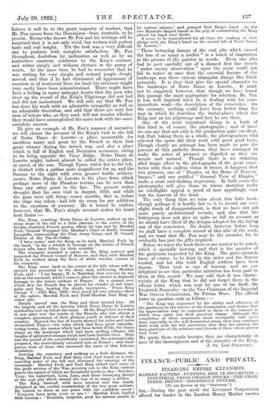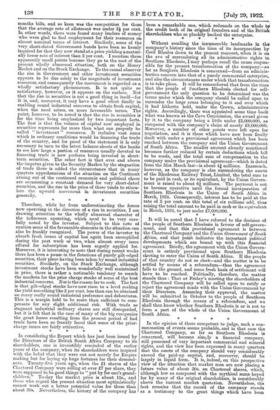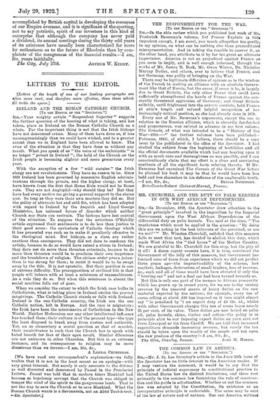MARKET FACTORS—FURTHER RISE IN SECURITIES— INDUSTRIAL PRIOR CHARGE STOCKS—THE CHAR,
TERED REPORT—RHODESIA'S FUTURE.
CTo THE EDITOZ or THE " SPECTATOR."1 SIR,—During the past week the Liverpool Corporation offered for tender in the London Money Market twelve months bills, and so keen was the competition for them that the average rate of allotment was under 2f per cent. In other words, there were found many lenders of money who were glad to fmd employment for their resources on almost nominal terms of interest. Similarly, some of the very short-dated Government bonds have been so keenly inquired for that they now stand at a price yielding amateri- ally lower rate of interest than 2 per cent. I mention these apparently small points because they go to the root of the present wholly abnormal situation, both on the Money Market and on the Stock Exchange. To the casual observer the rise in Government and other investment securities appears to be due solely to the magnitude of investment resources, and consequently the movement is regarded as a wholly satisfactory phenomenon. It is not quite so satisfactory, however, as it appears on the surface. Not that the rise in securities is not a good thing in itself—for it is, and, moreover, it may have a good effect finally in enabling sound industrial concerns to obtain fresh capital, when the need arises, on more favourable terms. The point, however, to be noted is that the rise in securities is for the time being emphasized by two important facts. The first is that the volume of capital now employed in securities represents far more than what can properly be called " investment " resources. It includes vast sums which in ordinary conditions would be financing the trade of the country, and for proof of the statement it is only necessary to turn to the latest balance-sheets of the banks to see how large a portion of resources usually devoted to financing trade is now perforce being invested in short- term securities. The other fact is that over and above the impetus given to the Security Market by the stagnation of trade there is added the circumstance that in many quarters apprehensions of the situation on the Continent arising out of the continued economic and political chaos are occasioning a constant demand for very short-dated securities, and the rise in. the price of these tends to stimu- late the upward movement in investment securities generally.
Therefore, while far from underestimating the forces now operating in the direction of a rise in securities, I am drawing attention to the wholly abnormal character of the influences operating, which need to be very care- fully noted by the investor. Subject to this note of caution some of the favourable elements in the situation can also be .frankly recognized. The power of the investor to absorb fresh issues of capital has again been exemplified during the past week or two, when almost every issue offered for subscription has been eagerly applied for. Moreover, it is interesting to note that during recent weeks there has been a pause in the flotations of purely gilt-edged securities, their place having been taken by sound industrial securities. Similarly, on the Stock Exchange, although investment stocks have been wonderfully well maintained in price, there is rather a noticeable tendency to search the markets for the prior charge stocks of some of the best industrial concerns. Nor is the reason far to seek. The fact is that gilt-edged stocks have now risen to a level making the yield something like 2 per cent. less than can be obtained on many really sound industrial preference and debentures. This is a margin held to be more than sufficient to com- pensate for any slight additional risk. With trade so stagnant industrial ordinary shares are still disregarded, but it is felt that in the case of many of the big companies the great losses resulting from the present period of bad trade have been so frankly faced that some of the prior- charge issues are fairly attractive.
In considering the Report which has just been issued by the Directors of the British South Africa Company to its shareholders, one is irresistibly reminded of the earlier years of the company, when its shareholders were inspired with the belief that they were out not merely for Empire making but for laying up huge fortunes for their descend- ants. Twenty-five years ago, when the shares of the Chartered Company were selling at over per share, they were supposed to be good things to " put by for one's grand- children." To-day the market price is about 15s., and those who regard the present situation most optimistically cannot work out a better potential value for them than about 30s. Nevertheless, the history of the company has been a remarkable one, which redounds on the whole 44 the credit both of its original founders and of the British shareholders who so pluckily backed the enterprise. * * * * Without recalling the innumerable landmarks in the company's history since the time of its incorporation by Cecil Rhodes down to the present moment, when it is on the eve of surrendering all its administrative rights in Southern Rhodesia, I may perhaps recall the cause respon- sible for the present transformation of the company—sa far as Southern Rhodesia is concerned—from an adminis- trative concern into that of a purely commercial enterprise,, and also the circumstances under which that transformation. is to take place. It will be remembered that from the time that the people of Southern Rhodesia elected for self- government the only question to be determined was the terms under which the company should be called upon to surrender the large areas belonging to it and over which it had hitherto held, under the Crown, administrative. rights. Accordingly, there was appointed some time back what was known as the Cave Commission, the award given by it to the company being a little under £5,000,000, as compared with the company's claim of nearly £8,000,000. Moreover, a number of other points were left open for negotiation, and it is these which have now been finally dealt with under a provisional agreement which has been reached between the company and the Union Government of South Africa. The smaller amount already mentioned becomes further reduced by certain deductions which fall to be made, and the total sum of compensation to the company under the provisional agreement—which is dated from the 31st March last—is about 4i millions. Inasmuch, however, as the company is also surrendering the assets of the Rhodesian Railway Trust, Limited, the total sum to to be paid in cash, or its equivalent, by the Union Govern- ment is raised to about 61 millions. The payment is not to become operative until the formal incorporation of Southern Rhodesia in the Union of South Africa in March, 1924. Consequently, interest has to be paid at the rate of 5 per cent, on this total of six millions odd, thus raising the total amount to be paid in cash or its equivalent in March,•1924, to just under £7,000,000.
It will be noted that I have referred to the decision of the people of Southern Rhodesia in favour of self-govern- ment, and that this provisional agreement is between the Chartered Company and the Union Government of South Africa, and that point indicates the important political developments which are bound up with this financial agreement. Briefly, the agreement with the Union Govern- ment is entirely provisional upon Southern Rhodesia electing to enter the Union of South Africa. If the people of that country do not so elect—and the matter is to be settled by means of a referendum—then the agreement falls to the ground, and some fresh basis of settlement will have to be reached. Politically, therefore, the matter stands thus : That at Friday's meeting the shareholders of the Chartered Company will be called upon to ratify or reject the agreement made with the Union Government by their Directors. Assuming their approval, the matter will be submitted in October to the people of Southern Rhodesia through the means of a referendum, and we shall then know whether Southern Rhodesia is or is not to form a part of the whole of the Union Government of South Africa.
In the opinion of those competent to judge, such a con- summation of events seems probable, and in that case the Chartered Company, so far as Southern Rhodesia is concerned, will become simply a financial company, still possessed of very important commercial and mineral rights, and the view has been expressed in many quarters that the assets of the company should very considerably exceed the paid-up capital, and, moreover, should be largely in liquid form. It is, indeed, on this prospective view of the situation that market men are now placing a future value of about 30s. on Chartered shares, which, although low as compared with the mythical sums hoped for by many of the original shareholders, is considerately above the current market quotation. Nevertheless, the fact remains that the record of the company stands as a testimony to the great things which have been * * * accomplished by British capital in developing the resources of our Empire overseas, and it is significant of the s rting, not to say patriotic, spirit of our investors in thisd of .. enterprise that although the company has never paid a dividend, its annual meetings during the thirty odd years of its existence have usually been characterized far more by enthusiasm as to the future of Rhodesia than by com- plaints of the meagreness of the financial results.—I am, Sir, yours faithfully,




































 Previous page
Previous page